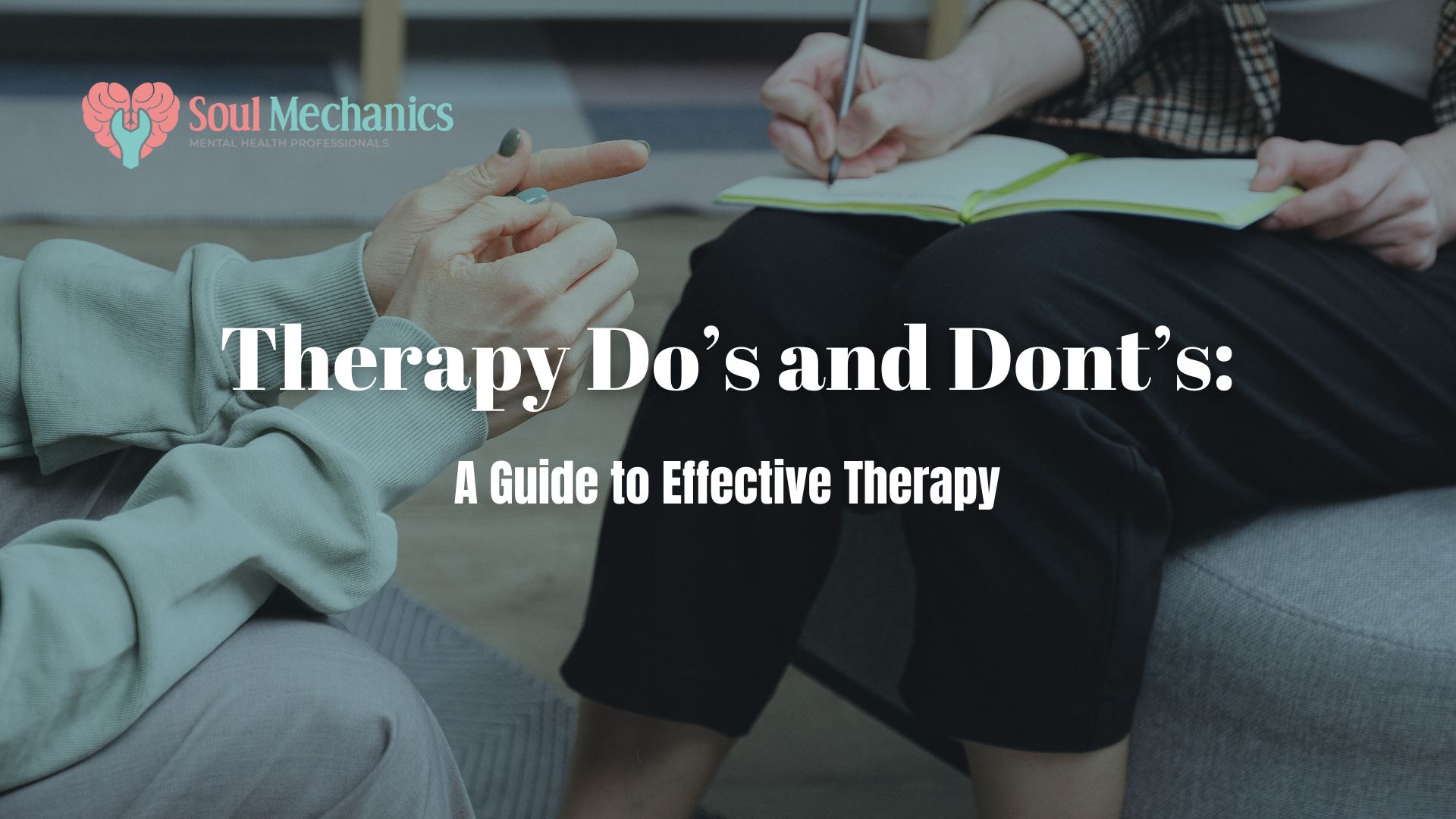Insights to Effective Therapy: Therapy Do’s and Don’ts
Insights to Effective Therapy: Therapy Do’s and Don’ts

Written By: Kelly Chan Jia Li, Clinical Psychologist (MAHPC(CP)00353)
Engaging in therapy can be a transformative journey towards better mental health and well-being.

Therapy can be a powerful tool to help you navigate life's challenges, achieve personal growth and help with understanding yourself. To make the most out of your sessions, it's essential to understand the behaviours and attitudes that can facilitate or hinder your progress in therapy. Let's get started.
The Do's in Therapy
Ask Questions
Why it Matters?: Having an understanding of the therapeutic process helps build trust and makes you more engaged in your therapy.
The How?: If you are unsure about something your therapist says or does, do ask for clarification. Do not hesitate to ask your therapist about their therapeutic modalities, your treatment plan, or any other concerns you might have.

Be Patient with the Therapy Progress
Why it Matters?: Therapy is a process that takes time. Hence, the progress might be slow and gradual.

The How?: Do give yourself and your therapist time to work through issues. It is important to recognise that setbacks are normal and part of the healing journey. You can always remind yourself that it took time to develop these patterns, and it will take time to change them.
Participate Actively in Sessions
Why it Matters?: Active participation can make therapy more effective as it fosters a collaborative therapeutic relationship. It shows your commitment and helps you get more out of each session.
The How?: You can engage in discussions, complete any homework or exercises given by your therapist, and practice new skills outside of sessions. For example, if your therapist suggests practising mindfulness exercises, make an effort to integrate them into your daily routine and discuss your experiences in the next session.
Importance of Consistency in Therapy
Why it Matters?: Having regular and consistent sessions builds momentum and continuity in your therapy, which is crucial for making progress.
The How?: You are encouraged to schedule and attend your sessions consistently (e.g., having therapy appointments biweekly). In an event where you need to reschedule, you can notify your therapist in advance of the rescheduling. Furthermore, it is also encouraged to keep the appointment time slot free and make it a priority in your schedule.
Reminder: If you or your loved ones are struggling with mental health, please don't hesitate to reach out to us at Soul Mechanics KD or Soul Mechanics Ipoh. Remember, seeking help is not a sign of weakness but strength!
The Don'ts in Therapy
Don't Hide Important Information
Why it Matters?: Your therapist needs a complete picture to help you effectively. Withholding significant details and information can hinder your progress and hinder your therapist's ability to help you effectively.

The How?: You can share information with your therapist, even if something seems minor or embarrassing. Therapists are trained to handle sensitive information and provide a safe space for you to express your concerns.
Don't Expect Immediate Solutions
Why it Matters?: Therapy is a gradual process and expecting quick fixes or solutions can lead to frustration and disappointment.
The How?: Focus on the journey and the small steps of progress rather than looking for immediate results. For example, instead of expecting your problems to disappear after a few sessions, you can learn to recognise the smaller victories or improvements.
Don't Skip Sessions
Why it Matters?: Consistency is key to making progress in therapy. Therapy is a continuous process where each session builds on the previous ones. Skipping sessions can disrupt this flow and make it harder to pick up where you left off.
The How?: It is encouraged to commit to attending your sessions regularly. For example, if you're feeling down and don't feel like going to your session, consider that this is when therapy might help you the most. Pushing through can lead to significant breakthroughs.
Don't Rely Solely on Therapist
Why it Matters?: Relying solely on your therapist limits your therapy progress by reducing self-responsibility, building resiliency and continuous growth. Taking an active role in your mental health journey can empower you, enhance personal growth, and prepare you for crises to foster a more effective therapeutic experience.

The How?: You can incorporate healthy habits such as exercise, healthy eating, sufficient sleep, and social support into your routine. For example, if you're working on reducing stress, complement your therapy with regular physical activity, relaxation techniques, and spending time with loved ones.
In a Nutshell
Effective therapy requires a collaborative effort between you and your therapist that builds on trust, honesty, and active participation. By understanding these do's and don'ts, you can create a conducive environment for growth and healing. Therapy can be challenging at times, but with patience, you can make significant positive changes towards better mental health and a more fulfilling life. Remember, therapy is a personal journey, and your commitment to the process plays a crucial role in achieving your mental health goals.
"It takes two to tango in therapy."
If you enjoyed reading this, why not broaden the horizon of knowledge by learning about "Therapy Tips and Preparation: Overcoming Anxiety"? You can read the blog here.
For more content related to mental health do follow us on our official Instagram.

